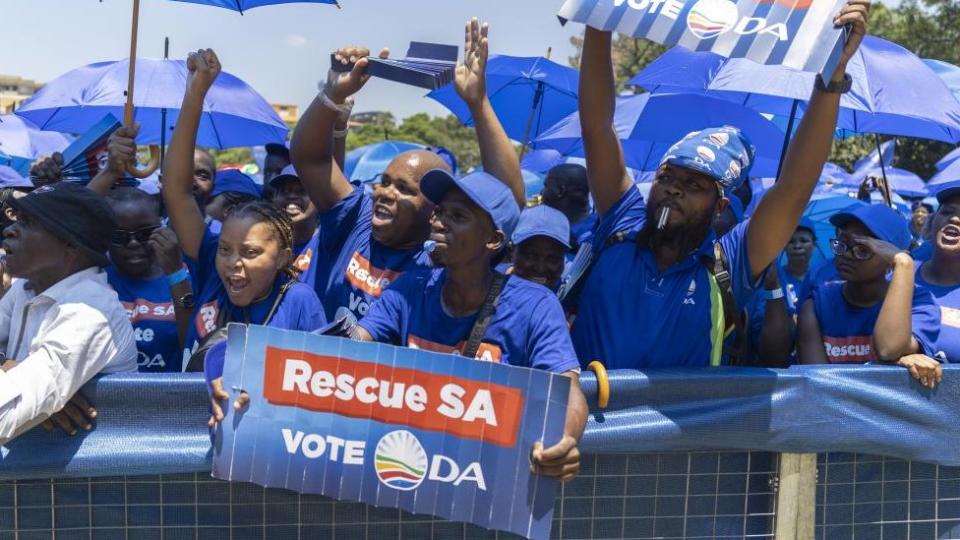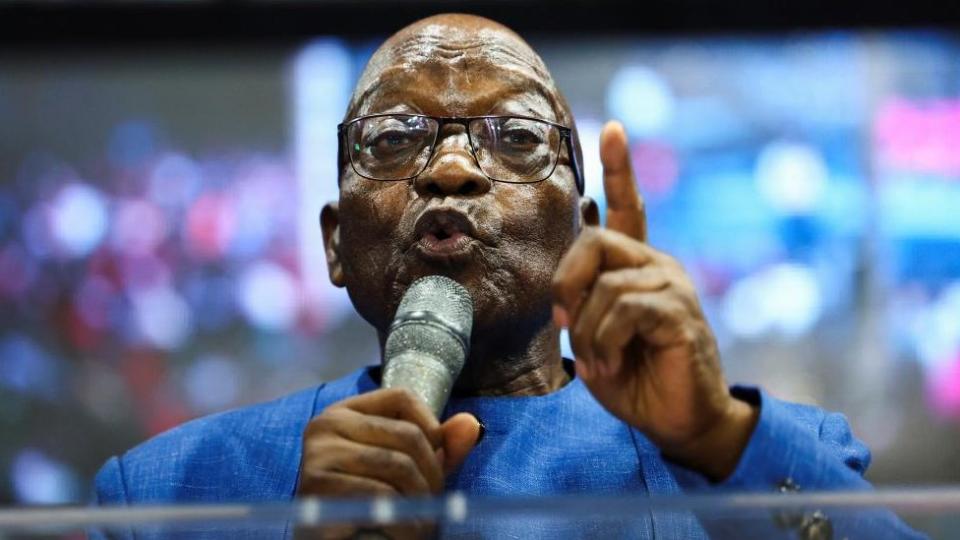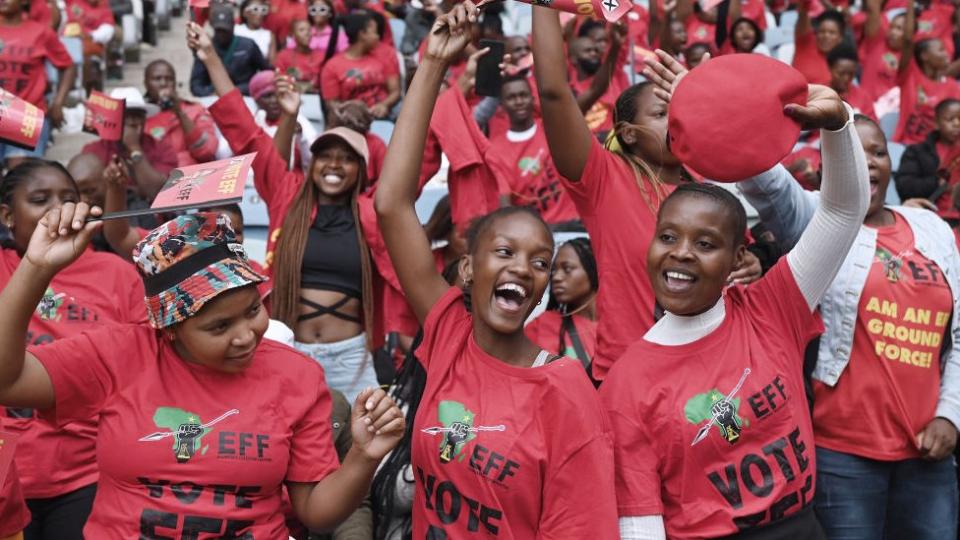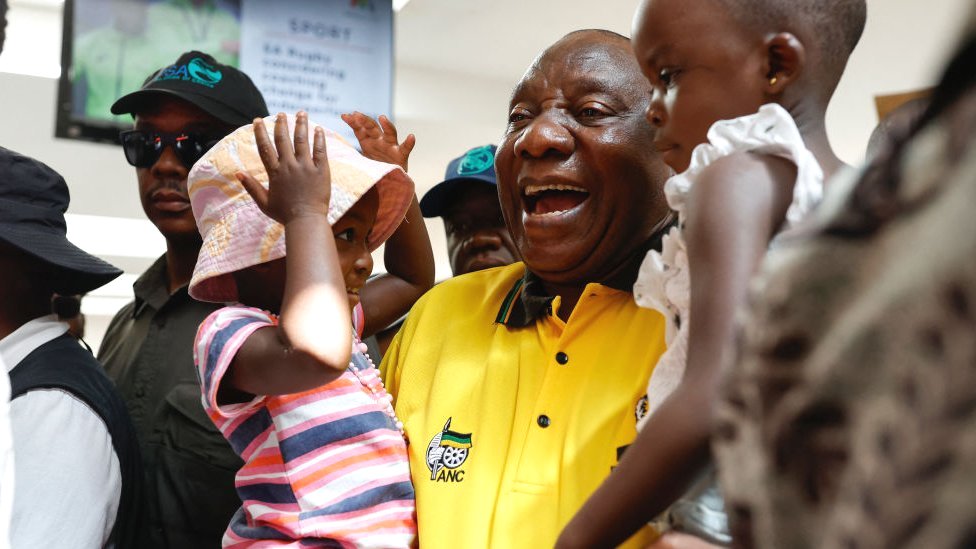Mounting criticism of the party that led the fight against apartheid under the late Nelson Mandela has chipped away at its support, raising the possibility of a coalition government.
When is South Africa’s election?
On 29 May, nearly 28 million South African registered voters have the chance to elect representatives to the national and provincial parliaments.
It will be the country’s seventh democratic general election.
They have taken place every five years since 1994, when white-minority rule ended and the ANC came to power.
What is at stake for the ANC and what are its policies?
The ANC, now led by President Cyril Ramaphosa, is under growing pressure.
Stubbornly high unemployment, which hit 32% last year, persistent economic inequalities, corruption allegations and frequent power cuts have reduced its popularity.
High levels of violent crime – on average 130 rapes and 80 murders a day in the last three months of 2023 – have also dented confidence in the authorities.
But the ANC says it is working to fix these problems.
And it is urging people not to throw away gains made since the end of apartheid. The party says poverty levels have fallen, a greater proportion of South Africans live in decent homes and access to healthcare has improved.
The ANC has promised to create millions more jobs over the next five years, to boost investment, support the private sector and end corruption.
What are the DA and EFF opposition parties offering?
The main opposition Democratic Alliance (DA) says the “country is in crisis”.
It wants to liberalise the economy, including a move towards greater privatisation.
It has pledged to create two million new jobs, end power cuts and “halve the rate of violent crime”.

To address unemployment and inequality, the Economic Freedom Fighters (EFF) – the third largest party in parliament – has radical economic solutions.
The party argues that the ANC has not redressed the racial economic imbalances of apartheid. It plans to redistribute land to the less well off.
The EFF also wants to nationalise mines, banks and other key parts of the economy, arguing that the wealth of the country would then be used to benefit the majority of the population.
What about Jacob Zuma and the MK party?
Disgruntled former President Jacob Zuma – who was ousted by Mr Ramaphosa amid corruption allegations that he denies and later jailed for defying a court order – has thrown his considerable political weight behind a fresh rival to the ANC.


The uMkhonto we Sizwe (MK) party, which has taken its name from the ANC’s former armed wing, adds further unpredictability to the race. It could make a strong showing in Mr Zuma’s home province of KwaZulu-Natal.
In a brief manifesto it pledges to transform South Africa, including an aim to create five million jobs.
Who could be South Africa’s next president?
South Africans do not vote for a president.
Instead they elect the 400 members of the National Assembly, who go on to vote for a new head of state within 30 days of the general election.


As a result, there are no presidential candidates as such, but each party leader fronts their national campaign and their portrait will appear on the ballot paper.
The ANC’s President Ramaphosa, the DA’s John Steenhuisen and the EFF’s Julius Malema will all feature prominently.
The leader of whichever party can muster a majority in the National Assembly after the election would be expected to become the next president.
How does the election work?
The proportion of seats that parties are allocated in the 400-member National Assembly is directly related to their share of the vote.
In 2024, independent candidates will be included for the first time.
This means that South Africans will cast three votes:
-
National parliament: One for 200 of the seats with just political parties named on the ballot
-
National parliament: One for the remaining 200 seats with a different ballot paper for each of the nine provinces, listing the parties in that region and independent candidates
-
Provincial assembly: One for the independent candidates or parties in the regional legislature.
How would a coalition be formed in South Africa?
The constitution does not spell out how a coalition could be formed.
But assuming the ANC remains the largest party, smaller groupings could informally agree to support an ANC government on a vote-by-vote basis in return for some concessions.
Or, at the other end of possibilities, the ANC could enter a formal coalition with some parties, including a written agreement outlining legislative plans and the distribution of cabinet posts.
Any other party would face the same choices.
But there is also a possibility of an opposition coalition.
In a pre-election deal, a group of parties – led by the DA – has signed up to what has been called the Multi-Party Charter for South Africa. If together they get more than 50% of the seats, they have already agreed to form a coalition. The agreement does not include the EFF.
